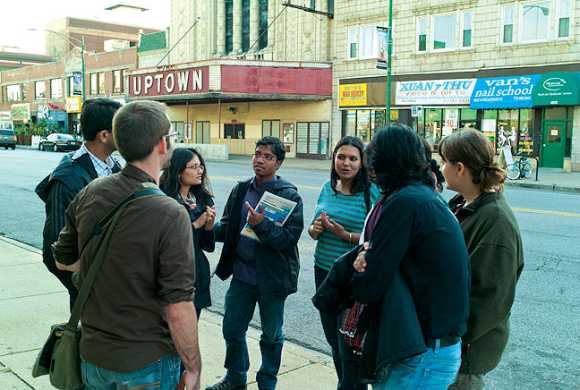
Social work students from India and the University of Chicago are using a new international exchange programme to learn about each other's cultures and how organisations in both the countries confront poverty and economic disadvantages.
The first group of four Indian students visited Chicago this fall as part of the University of Chicago School of Social Service Administration and the Tata Institute of Social Sciences international exchange partnership programme. SSA sent eight students to Mumbai in 2010 and seven last summer. During their month-long stay in India, students performed class and fieldwork.
The course work in Mumbai looked at poverty and the global economy, the role of non-governmental organisations, social exclusion and labour, urban space and crime, and minorities and gender in development.
In Chicago, students from Mumbai participated in courses including urban development, policy formation and human rights. They accompanied SSA students at work in their field placement agencies, and visited local organisations working with the poor in several Chicago neighbourhoods.
"My experiences in India changed my life forever. I spent most of my time in Mumbai and a few days in Delhi. I quickly became aware of social injustice in Mumbai, particularly in the slums," Christopher Jaffe, a student at SSA, told India Abroad.
"The people I met in the slums are strong advocates for social change. They take responsibility for challenging corruption, obtaining access to resources, and fighting for their freedom."
Jaffe, who was impressed by the display of generosity of Indians, said some people he met in the slums had almost no money or food, but still offered him tea and a meal simply because he was a guest.
Robert Chaskin, associate professor, SSA, and an organiser of the exchange, said the programme sought to provide students with a window on how urban poverty is generated and reproduced.
Mouleshri Vyas, associate professor and chairperson, Centre for Community Organisation and Development Practice, School of Social Work, TISS, said, "this interface with SSA at the University of Chicago connected Indian students from a university that has a long history of social work education, and a city with a history of community development and organisation."
Chaskin said the exchange works well because of similarities and differences between India and the United States. The programme reflects growing academic interest from universities in developing a global perspective.
"Many of our students are beginning to think critically about international social welfare, and some are interested in working internationally," he said.
For students taking part in the programme, the experience was an eye-opener. Students from India were surprised to see how much segregation and youth crime exists in Chicago. "What I noticed in Chicago is the inequality and marginalisation of people who seemed to be excluded from opportunities,' said Reema Malek, an Indian student participating in the exchange. "There is segregation; people seem to be secluded in specific places."
Students said they were impressed with the attitudes of the social workers they met, and their desire to serve the people.